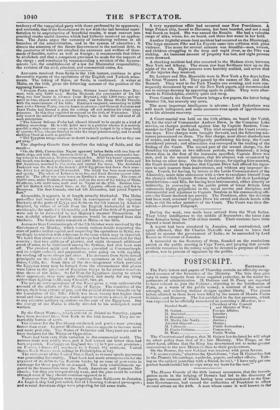Accounts, received from Syria to the 11th instant, continue to
give favourable reports of the operations of the English and Turkish arma- ments. The taking of Sidon, or Saida, is confirmed. A writer at Malta, on the 16th, gives the following account of the position of the opposing forces-
" Ibrahim Pasha was at Djebel Senin, thirteen hours' distance front Bey- rout, with only 6,000 men. Sheiks Meshoud, the commander of his left wing, was four hours in advance (near Beyrout), with 1,200 men; and op- posed to him, almost within a stone's throw, was the Bruce Sheikh Tranzir, with the mountaineers of his tribe. Ilrahhn's vanguard, amounting to 2,000 men under Osman Pasha, was six hours in advance; and General Joe-limas and lent Pasha had formed a plan for cutting off and making his whole corps prisoners. In this they expected to succeed on the 2Sth of September. They only waited the arrival of Commodore Napier, who is the life and soul of all such enterprises. "The famous Soli= Pasha had allowed himself to be caught in a kind of military mousetrap. He is with 2,500 men in a position whence it is scarcely possible a single man can escape. as he is completely hedged in by a large body of country-folks, who are directed to take the corps prisoners only, and to avoid shedding blood as touch as possible. "The Egyptian troops continue to desert in small parties as fast as they can get away." The Augsburg Gazelle thus describes the taking of Saida, and the result— "Ott the 261b, Commodore Napier appeared before Saida with two line-of- battle ships, and with the Austrian division. The Egyptian commander hay- ing refused to surrender, Napier commenced fire. After two hours' cannonade, the breach was declared practicable ; and 1,000 British, with 1,000 Turks and 200 Austrians, marched to the storm, and carried the town. The Archduke Frederick was the first in the breach : 2,000 Egyptians laid down their arms : the Allies lost 40 dead and 70 wounded. The result has been most complete and speedy. The whole of Lebanon is on tire, and Emir Desehir cannot with- stand it. The effect was even worse on Ibrahim's own troops. The corps of 10,000 men, under Ibrahim, dispersed ; and on the news of' the taking of Saida, 60 officers with 4,000 men, went over to Napier on the 27th. Ibrahitn him- self left lialheck with a small three, as the Egt ptian officers say, and fled to Damascus. The four Consuls, who bad left Alexandria, had joined Napier's fleet."
Alexandria, it appears, is at length actually blockaded. The Malta post-office had issued a notice, that in consequence of the vigorous blockade of the ports of Egypt and Syria on the 6th instant by Admiral Stopford, by virtue of orders from the English Ambassador at Con- stantinople, the mails for Alexandria and India of the 30th of September were not to be forwarded by her Majesty's steamer Prometheus. It was doubtful whether French steamers would be excepted from this blockade. The India mails remained at Malta on the 16th.
Accounts from Constantinople of the 7th October were received by the Government on Monday. which contain various details respecting the state of parties in that capital, and respecting the operations in Syria, ex- ceedingly instructive with reference to the issue which may be expected. We learn that about 6,000 additional troops had been embarked fir that country ; that two millions of piastres, and eight thousand additional stand of arms, to be distributed among the Syrians, had also been sent off: The greatest spirit and enthusiasm prevailed at Constantinople and its neighboarhood, and preparations were going on with rapidity for sending off more troops and arms. The accounts from Syria turned principally on the details of the vArions operations at the taking of Sidon, Cuiffa, 8:,e. Some idea of the discouragement which pervades the Egyptian army may be formed from the circumstance that places were taken in the preseuce of Egyptiau troops in far greater numbers than those of the Alii.. So far fruits tile Egyptians daring to attack their opponents, they were quite dispirited, and ready for any thing rather than fighting.—.11,:.ning Cinvoinle, Oct. 28.
The private correspondence of the Thaw gives a very enfavourable account of the affairs of the Pasha of Egypt. The condition of the troops, their long arrears of pay, cad the general distress brotOit on by the inundation of the Nile, which has risen twenty feet higher than usual and done great damage, would appear to create a cheek at present to any effective tnilitaty operations on the part of the Egyvians. lint the energy of the Pasha is chiefly directed to his anticipated naval warfare.


























 Previous page
Previous page